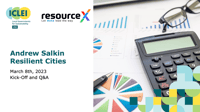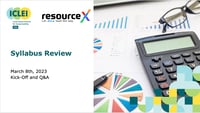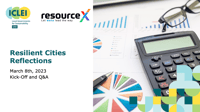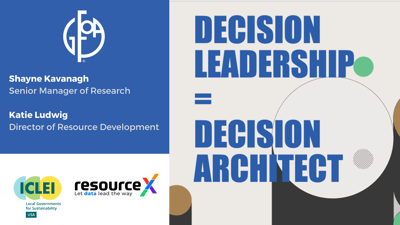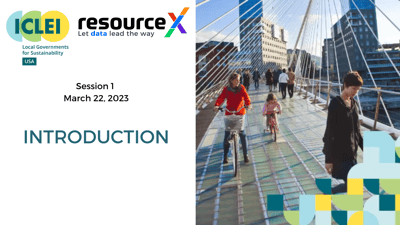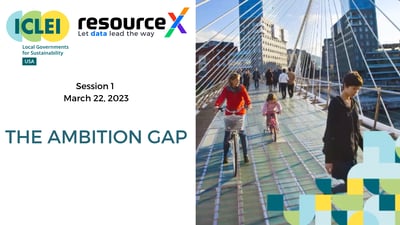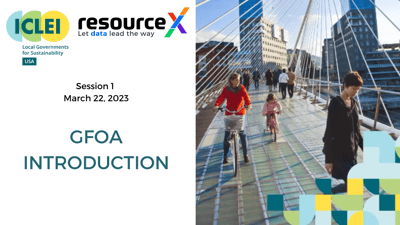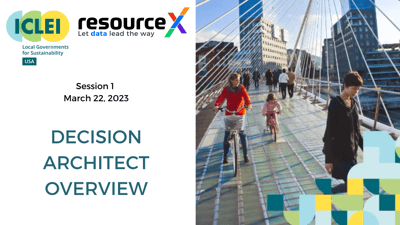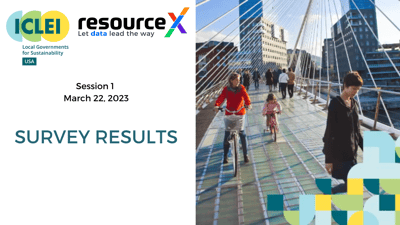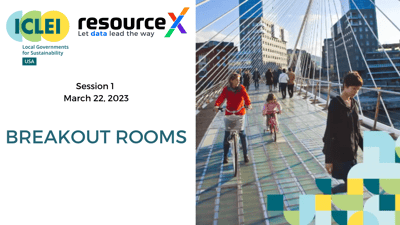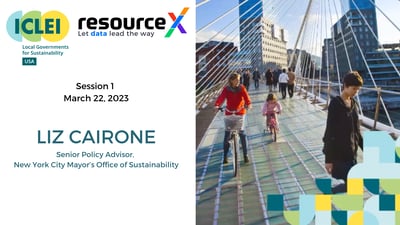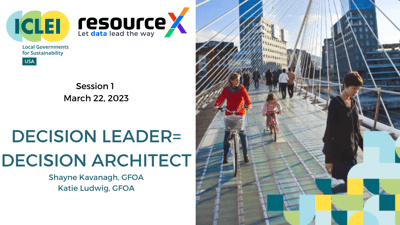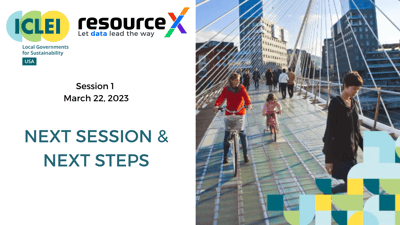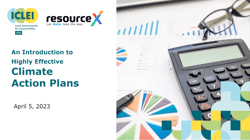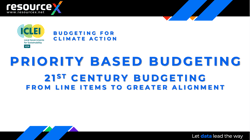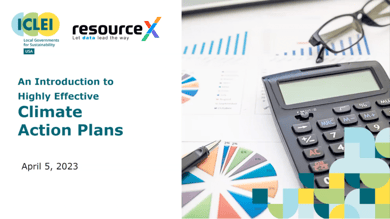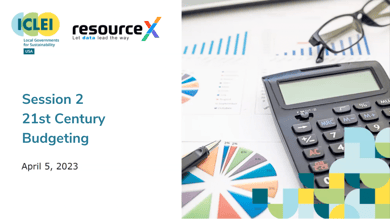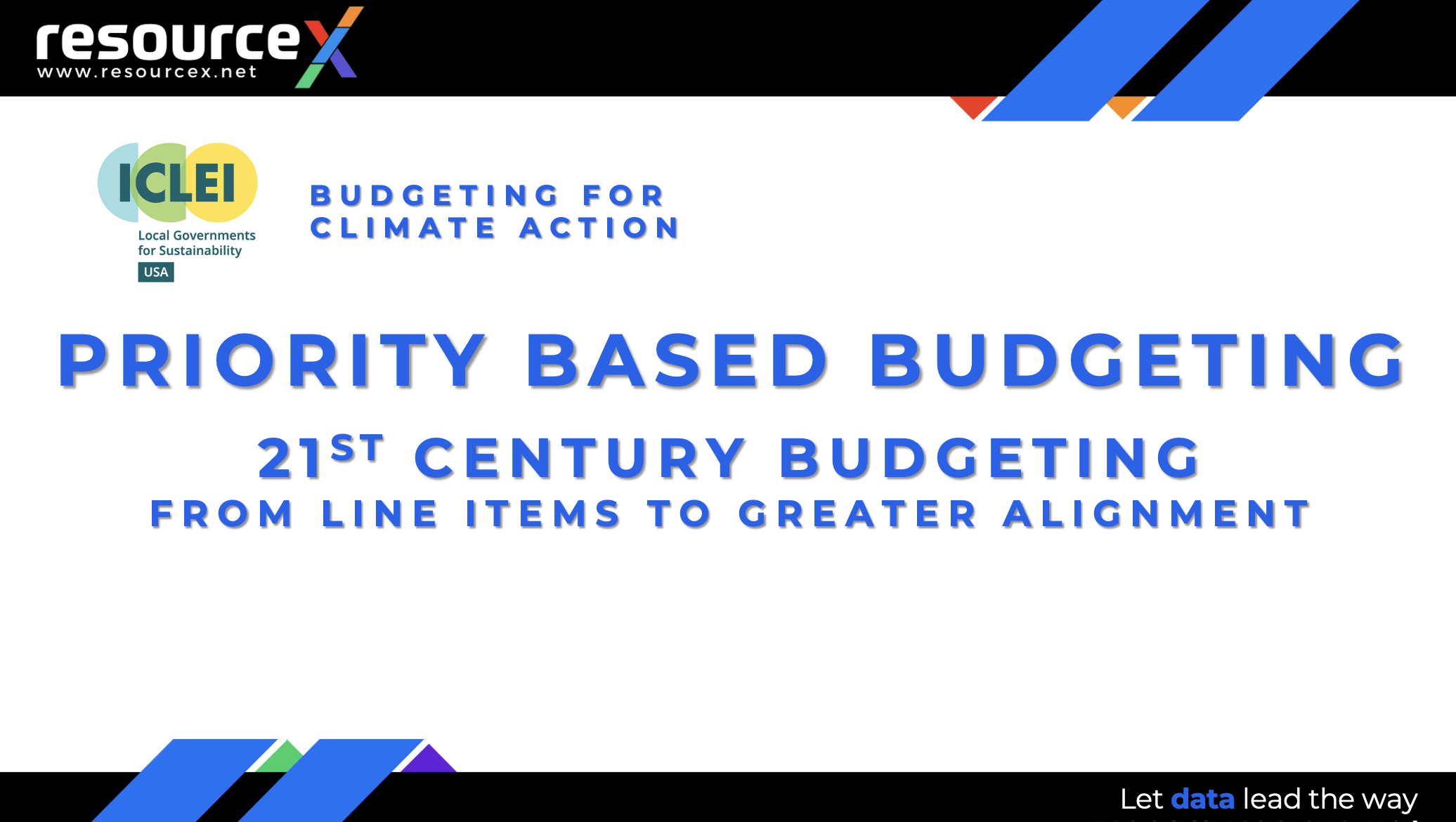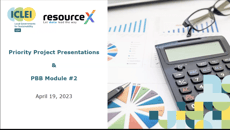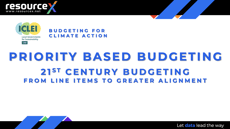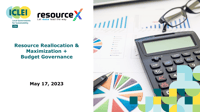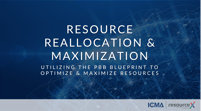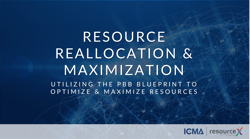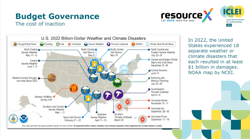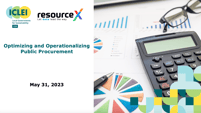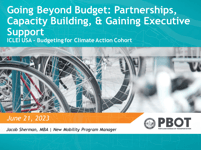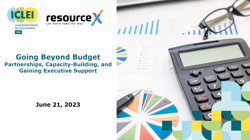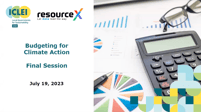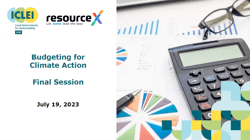
.png?width=1600&height=300&name=The%202023%20Cohort%20Class%20(2).png)
.png)
Work Plan and Training Schedule
Purpose
- Provide a macro overview of local government capabilities and the need to create purpose-driven budget and finance strategies.
- Familiarity with the role cities/counties have in addressing climate action and new ways to approach budgeting for impacts, not just filling line items. What are “climate” items in the budget? What do you “control”?
- Create a common understanding of city/county climate priorities and how the current budget is/is not addressing the needs.
- Introduce participants to Priority Based Budgeting (PBB) and the larger insights process.
- Identify what works and ways to improve collaboration and communication between budget, procurement, and climate teams.
- City/counties match their critical climate projects with budget and finance tools needed for delivery.
- Determine the primary project and the team responsible for delivery.
- Create a budget request and procurement design strategy.
Roles and Expectations
Local government staff
- Attend training sessions and review materials suggested by ICLEI- Local Governments for Sustainability USA (ICLEI USA) and Resource X (RX) (recordings and slides will be made available to those who cannot be present at a session).
- Regular communication between city/county staff to determine the distribution of tasks, establish deadlines, discuss progress, and resolve any challenges. Staff is expected to communicate limitations regarding availability and technical capacity to each other, ICLEI USA, and RX.
Time commitment
The time commitment for city/county staff during the course of the program will vary based on:
-
- Level of depth/detail on certain tasks (Review the step-by-step guidance for an estimated range of hours for each task).
- How “complete” you would like the deliverables to be.
- How tasks are distributed between staff.
For a deliverable that includes the minimum necessary components and is nearly ready for finalization and adoption:- You need approximately 6 working months.
- An average of 6 hours per week (total, not just for fellows or staff), with some weeks requiring more or less for fellows and/or staff depending on the task and the desired scope/methodology for the task.
- Time should be distributed appropriately based on known schedule limitations (vacations, work, etc.).
- Complete and/or coordinate the completion of tasks involved with the above.
ICLEI USA and Resource X
- Deliver trainings and one-on-one technical assistance to fellows and staff.
- Share recordings/slide decks.
- Review deliverables.
Cohort Partners
- Resilient Cities Catalyst
- Government Finance Officers Association
- The Institute for Public Procurement
Introductory remarks from each participating trainer and participants:
Learning Objectives
- Introduction to the State of Play
- Problem, statement, and what is our objective?
- Overview of cohort schedule, roles/expectations, Cohort Resource webpage (in development), Google Drive, other tools to be used
- Framework and Trends (SDGs, CDP, Bond Ratings, ESG, Federal investment opportunities), Circulation of City Project Descriptions
- Provide a Macro Overview of Local Government Capabilities, Opportunities and the Need to Create a Whole of Government Approach to Accelerating Climate Action
Trainers
Andrew Salkin, RCC
Chris Fabian, RX
Erik Fabian, RX
Angie Fyfe, ICLEI USA
Participating local government staff:
Sustainability
Procurement
Finance
Homework
Read ICLEI USA Ambition Gap Policy Brief
Read ResourceX Essential Guide to Priority-Based Budgeting
Complete Organization Overview Survey Exercise
Complete Baseline Participant Survey
Kick Off Recordings
Until just a decade ago, there was no such thing as a sustainability director or chief resilience officer for cities. Now, cities feel incomplete without them. What are these jobs, and why are they so essential to achieving urban sustainability goals?
Learning Objectives
- Understand core roles and responsibilities of CRO, CFO and Procurement through select participant introductions and job descriptions.
- Understand a “day in the life” of each respective CRO, CFO and Procurement position. Understand pressures, overlapping goals and opportunities.
- Discover how organizations can create an environment of collaboration for CROs, CFOs and Procurement Officers to work collectively toward achieving sustainability goals.
- Improve the integration and alignment of budgetary, procurement and staffing resources and policy tools to be consistent with the execution of climate plan objectives.
Trainers
GFOA
Participating local government staff:
Sustainability
Procurement
Finance
Homework
Evaluate the coordination of your organization in executing climate plan objectives. How can coordination be improved? What will it take to institutionalize better coordination? Who needs to be involved to direct and communicate better coordination? Be prepared to discuss at our next session.
Read Flagstaff, AZ case study
Read Pittsburgh, PA case study
Session 1 Recordings
How do organizations address the Ambition Gap? What are best practices in moving from climate planning to climate action? How are organizations designing effective climate action implementation plans? How are organizations funding these actions? How are organizations developing a decision-making framework to ensure sustainability is a core focus of the budget process?
Learning Objectives
- Identify elements of a “failure to launch” cycle and the importance of moving beyond climate planning to invest more time and resources into the implementation of climate action.
- Recognition of High-Impact Actions within municipal control and Budgeting linkages (ICLEI USA + RX).
- Introduce Priority Based Budgeting Module I - Building Greater Alignment.
- Learn the concepts and application of a decision-making framework to better align resources towards climate goals.
Homework
 Participant cities need to further consider and identify their proposed high-priority project focus for this cohort. Be prepared to present on high-priority projects, why they are a high priority, identify funding (or lack thereof), identify greatest potential obstacles, identify who within the org (and potentially) outside needs to be involved to make this successful—with an emphasis on coordination between CRO, CFO and procurement—and forecasted timeline to implement during lesson 3.
Participant cities need to further consider and identify their proposed high-priority project focus for this cohort. Be prepared to present on high-priority projects, why they are a high priority, identify funding (or lack thereof), identify greatest potential obstacles, identify who within the org (and potentially) outside needs to be involved to make this successful—with an emphasis on coordination between CRO, CFO and procurement—and forecasted timeline to implement during lesson 3.
*Preferably, high-priority projects should not be fully funded for the rest of the curriculum to be effective and beneficial.
Session 2 Recordings
Learning Objectives
- Cities Outline their High-Priority Projects and create descriptions of current budget cycle approaches (RX).
- Create a common understanding of city climate priorities and how the current budget is/is not addressing the needs.
- Discuss equity considerations in the development and implementation of climate and budget initiatives.
- Introduce PBB Module 2 Communication, Accountability, & Accessibility.
Trainers
ResourceX
ICLEI USA
Participating local government staff:
Sustainability
Procurement
Finance
Homework
- What are the specific roles and responsibilities of sustainability, budget/finance and procurement teams to support implementation?
- Have your priority projects been formally funded (at any level) in your operating or capital budgets?
- Have you identified any Federal funding opportunities for this project? If so, how are you planning to apply?
- What (if any) equity impacts have been considered in support of your priority project implementation?
- Do you need any specific additional support from ICLEI USA/ResourceX to further develop implementation plans?
Session 3 Recordings
Priority Based Climate Budgeting - Concepts + Tools Office Hours
This is a voluntary opportunity for cohort participants to bring questions and learn more about Priority Based Climate Budgeting concepts and tools. Office hours sessions will be held on Wednesday, May 3rd, between 2 and 3 pm EST and Wednesday, May 10th, between 2 and 3 pm EST.
To join either session click this zoom link here.
Introduce participants to PBB and the larger insights and budget development process. ICLEI USA and Lead cities share current climate and budget wins, reviews and engagements. Participants will finalize the Priority Project(s).
Learning Objectives
- Introduce PBB Module 3 Resource Reallocation & Maximization.
- Identify what works and ways to improve collaboration and communication between budget and climate teams.
- Learn concepts towards aligning municipal resources to climate priorities.
- Explore regional partnerships and contracting opportunities.
Trainers
ResourceX
ICLEI USA
Participating local government staff:
Sustainability
Procurement
Finance
Homework
- Sourcing (reallocation)
- Efficiencies (reallocation)
- Service Levels (reallocation)
- Fees & Charges (maximization)
- Grant Funding (maximization)
- Taxes & Rates (maximization)
Session 4 Recordings
Learning Objectives
- Evaluate key opportunities for GHG or Adaptation Investments and Identify Investment Allocation Pathways.
- Understand IRA & IIJA opportunities and how to leverage local budgets for large investments.
- Communities match their critical climate projects with budget, finance and procurement tools needed for delivery.
- Draft and evolve project implementation plan(s).
Trainers
ResourceX
ICLEI USA
Participating local government staff:
Sustainability
Procurement
Finance
Homework Content
Begin evaluating priority project procurement with a focus on:
- RFP design reform
- Improving supply chain diversity and vendor competition
- Policy reform that provides flexibility in selecting the most competitive bidder (not solely based on lowest price)
Session 5 Recordings
-
Learning Objectives
- Strategic and Cross-Agency/Sector Partnerships + Creating Delivery Strategies and Procurement Models.
- Discuss how to institutionalize climate and/or budget process through adopted policy, proclamation and/or code adjustment.
Trainers
ResourceX
ICLEI USA
Participating local government staff:
Sustainability
Procurement
Finance:
Homework Content
- Prep for Session 7 presentations
- Review and consider adopting Ann Arbor and/or PDX implementation plans as examples for participant presentations
- Meet in buddy groups with ICLEI USA + ResourceX team members
- Prepare a short presentation on status and outcomes of priority projects
Session 6 Recordings
*Weeks of June 26 or July 10: One on One Project Consultations and/or Office Hours
- Virtual
- RX and ICLEI USA teams will meet with each participating community to scope a project that each will pursue throughout the rest of the cohort.
-
Learning Objectives
- Developing the budget and program delivery plan
- Creation of budget request and procurement design strategy
Trainers
ResourceX
ICLEI USA
Participating local government staff:
Sustainability
Procurement
Finance:
Session 7 Recordings
About the Collaborators
 ResourceX is the only software provider for the data-driven, decision-making budgeting solution known as Priority Based Budgeting (PBB). PBB strategically aligns resources with community outcomes to support local government efforts to increase transparency, optimize resources, and pursue ambitious goals important to residents. Using PBB with the ResourceX software provides a powerful platform to understand the actual cost of the services local government provides and to ensure those services align with community priorities.
ResourceX is the only software provider for the data-driven, decision-making budgeting solution known as Priority Based Budgeting (PBB). PBB strategically aligns resources with community outcomes to support local government efforts to increase transparency, optimize resources, and pursue ambitious goals important to residents. Using PBB with the ResourceX software provides a powerful platform to understand the actual cost of the services local government provides and to ensure those services align with community priorities.
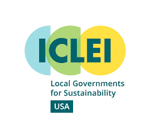 ICLEI USA is a global network of more than 2,500 local and regional governments committed to sustainable urban development. Active in 125+ countries, ICLEI influences sustainability policy and drives local action for low-emission, nature-based, equitable, resilient and circular development. ICLEI USA is an acknowledged leader in local government technical assistance, providing the tools, standards, and programs for local governments to measurably reduce carbon emissions.
ICLEI USA is a global network of more than 2,500 local and regional governments committed to sustainable urban development. Active in 125+ countries, ICLEI influences sustainability policy and drives local action for low-emission, nature-based, equitable, resilient and circular development. ICLEI USA is an acknowledged leader in local government technical assistance, providing the tools, standards, and programs for local governments to measurably reduce carbon emissions.
Guest Presenters (TBC)
Resilient Cities Catalyst (RCC), fosters cross-department collaboration to enhance communications and process awareness.
Government Finance Officer Association (GFOA) provides timely information, practical educational opportunities, high-quality professional publications, and the latest information on best practices for government finance professionals.
National Institute for Government Procurement (NIGP) brings additional credibility as the lead supporting agency for government and institutional procurement officers.
Desired Outcomes
Participant Teams will:
- Identify annual budget components that have climate action implications;
- Co-develop a project that will advance an activity from a municipal climate action plan and includes it as a component of the municipal budget;
- Develop a corresponding procurement execution plan or RFP solicitation designed to execute budget appropriations;
- Develop policies or procedures for enduring communication and collaboration between sustainability and climate efforts and budget and procurement exercises.
- Commit to including sustainability staff lead in the city/county budget process.
Content
Instructors will provide:
- Climate budgetary evaluation, execution and risk analysis.
- Introduction to priority-based budgeting systems and tools;
- Identification of municipal tools for mitigation and adaptation such as fleet, facilities, energy and materials procurement; and land use, infrastructure and development decisions is in great need;
- Awareness of national and international frameworks for climate action that impact municipal finance (such as Sustainable Development Goals); Task Force on Climate-Related Financial Disclosures (TCFD), Sustainable Accounting Standards Board (SASB);
- Identification of opportunities to intersect climate action planning alongside budget cycles and more sustainable forms of procurement;
- Capabilities to foster enhanced climate-focused communication and consideration across the organization (and specifically across procurement, budget and sustainability offices.
Our Outcomes
Solve Past Budget Allocation Challenges with Priority-Based Budgeting
Restructure your budgeting process around the programs you offer, making spending more meaningful, logical, and transparent. In 2021, our PBB software helped local governments uncover:
$73M
in budget-repurposing opportunities
$73M
in budget-repurposing opportunities
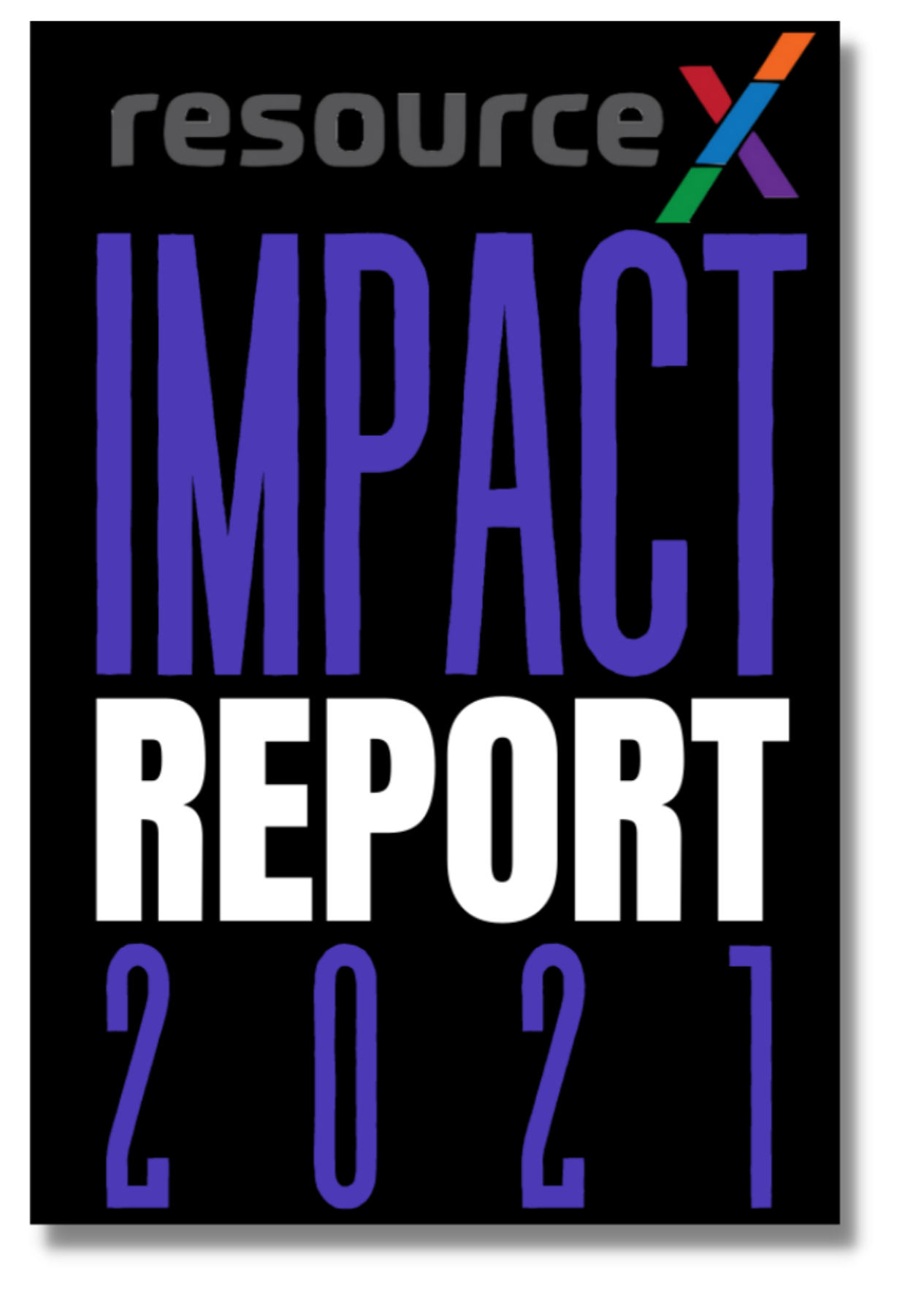
ResourceX 2021 Impact Report
Download Our Complete 2021 Impact Report
PBB Resources
Explore Priority-Based Budgeting Resources

Webinar
ICLEI USA and ResourceX Partner to Advance Sustainability in Local Government

Webinar
Climate Budgeting: Connecting Resources with Climate Initiatives

Blog Post
The Power of Communicating Programmatically

Blog Post
Budgeting for an Equitable Future
.png)
Webinar
Rethinking Revenues & Resilience Two Years After COVID
Subscribe to our email insights.
Local Governments are the Vehicle to Produce a Better World… Starting with Your Community
Local governments are uniquely positioned to make significant progress on some of society’s greatest challenges such as inequality and climate change. If there’s one common bond among all of the challenges we’re most interested in solving, it’s that we’re going to need resources available to fund the solutions. ResourceX PBB software solutions empower communities to tackle today’s challenges, unencumbered by limited resources.

Meet Community Needs Without Spending More
Using PBB combined with software, ResourceX helps communities identify what is most important to ensure your resources are aligned with your community’s vision.

Know What You Spend on Everything
Traditional budget processes don’t seriously question the spending decisions made in years past. Too many local governments continue to base their funding decisions on this traditional budget process. PBB makes budgeting more meaningful and transparent by identifying the full cost of all programs provided and basing decisions on true cost of providing those services.

Do the Big Things Well, Within Budget
When everything is appropriately prioritized, it’s easier to do the big things well while being smart, efficient, and transparent about every dollar spent.

Get Real Data for the Decision Makers
Clarify details important to decision makers, clearly stating the purpose of the program, how much it costs to deliver, and how it aligns with the overall priorities of the community.
-1.png)






